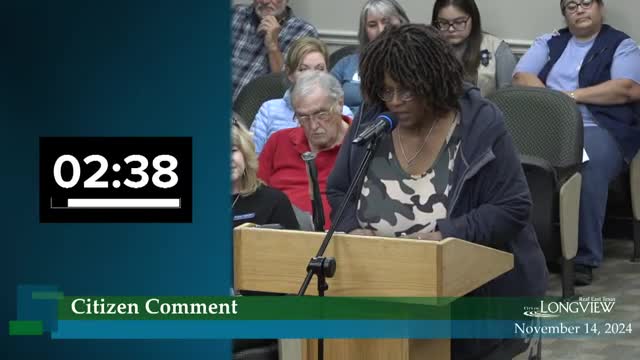Longview Council Approves Controversial Animal Ordinance
November 15, 2024 | Longview, Gregg County, Texas
This article was created by AI summarizing key points discussed. AI makes mistakes, so for full details and context, please refer to the video of the full meeting. Please report any errors so we can fix them. Report an error »

During a recent Longview City Council meeting, significant discussions centered around the proposed amendments to the animal ordinance and the preservation of historical structures in the community.
One resident expressed concerns about the misuse of authority by local officials, recounting personal experiences of feeling marginalized during legal proceedings related to property issues. This individual emphasized the importance of preserving historical buildings located on South Martin Luther King Boulevard, which they argued are integral to Longview's cultural heritage and local tourism. The Longview Historic Preservation Committee has noted that protecting such structures not only fosters community pride but also supports educational initiatives.
In a separate discussion, G Floyd advocated for the swift implementation of the animal ordinance amendment, which aims to address local animal control issues. Floyd highlighted the necessity of educating the community about the ordinance and proposed a timeline of one to two years for full implementation. He suggested using water bills to disseminate information about the ordinance to residents.
Tori Anderson, representing the Longview Kennel Club, expressed gratitude to the council for considering the concerns of local breeders and for making adjustments to the ordinance. She emphasized the club's willingness to collaborate with the city on animal welfare initiatives.
The council also discussed the practicalities of enforcing the new ordinance, particularly in light of current staffing shortages in the animal control department. Several council members raised concerns about the potential strain on staff and the need for adequate resources to ensure effective enforcement. A proposal was made to delay the imposition of fees associated with the ordinance until the department is fully staffed.
The council ultimately approved the ordinance amendments, with a commitment to evaluate the associated fees and their impact on the community, particularly on vulnerable populations. The new regulations are set to take effect on February 1, 2024, with ongoing discussions about staffing and community education continuing in the lead-up to implementation.
One resident expressed concerns about the misuse of authority by local officials, recounting personal experiences of feeling marginalized during legal proceedings related to property issues. This individual emphasized the importance of preserving historical buildings located on South Martin Luther King Boulevard, which they argued are integral to Longview's cultural heritage and local tourism. The Longview Historic Preservation Committee has noted that protecting such structures not only fosters community pride but also supports educational initiatives.
In a separate discussion, G Floyd advocated for the swift implementation of the animal ordinance amendment, which aims to address local animal control issues. Floyd highlighted the necessity of educating the community about the ordinance and proposed a timeline of one to two years for full implementation. He suggested using water bills to disseminate information about the ordinance to residents.
Tori Anderson, representing the Longview Kennel Club, expressed gratitude to the council for considering the concerns of local breeders and for making adjustments to the ordinance. She emphasized the club's willingness to collaborate with the city on animal welfare initiatives.
The council also discussed the practicalities of enforcing the new ordinance, particularly in light of current staffing shortages in the animal control department. Several council members raised concerns about the potential strain on staff and the need for adequate resources to ensure effective enforcement. A proposal was made to delay the imposition of fees associated with the ordinance until the department is fully staffed.
The council ultimately approved the ordinance amendments, with a commitment to evaluate the associated fees and their impact on the community, particularly on vulnerable populations. The new regulations are set to take effect on February 1, 2024, with ongoing discussions about staffing and community education continuing in the lead-up to implementation.
Don't Miss a Word: See the Full Meeting!
Go beyond summaries. Unlock every video, transcript, and key insight with a Founder Membership.
✓
Get instant access to full meeting videos
✓
Search and clip any phrase from complete transcripts
✓
Receive AI-powered summaries & custom alerts
✓
Enjoy lifetime, unrestricted access to government data
30-day money-back guarantee

